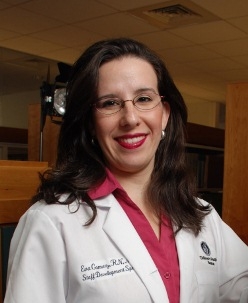Growing the Latino Nursing Workforce
To increase the number of Latino nurses, especially in pediatrics, the profession needs to address barriers and increase support. To learn more, the IPN talked with Eva Gómez, MSN, RN-BC, CPN about these issues and compiled a list of resources and articles.
Eva is passionate about educating nurses to strengthen their practice--and about increasing diversity in the nursing workforce. Besides her career as a Professional Development Specialist at Boston Children's Hospital, she is an outstanding advocate on many levels to support the Hispanic community and amplify her love of pediatric nursing. She also mentors high school students interested in health careers through Boston Children's Hospital's Student Career Opportunity Outreach Program (SCOOP) and serves on the Diversity Advisory Board of the William F. Connell School of Nursing, Boston College. he is a member of the Multi-Cultural Nurses Forum, the Diversity and Culturally Competent Care Council, and is 2015 Nursing Science Fellow. Her personal experiences as an adult open-heart surgery patient have been featured in Huffington Post and as part of the American Heart Association's Go Red Por Tu Corazón awareness campaign for women.
Interview
IPN: Do you feel there any misconceptions in the Latino community about nursing careers?
Eva: I think we have room to grow in terms of what we understand and perceive the work of the nurse to be.
Many Latino students are often asked, "Why would you want to be a nurse? Why not be a doctor?" This question is based on the misconception that nurses are kind and caring, but they are not perceived as knowledgeable or "smart" as our physician colleagues. Today's media still lacks an accurate portrayal of the nursing professions, depicting them as second hand to physicians instead of collaborators in a team effort caring for patients.
Contrary to what many people perceive, nurses have to know as much as physicians and other clinicians to integrate the science of clinical care with human compassion. As nurses, we are expected to have comprehensive knowledge about anatomy, physiology, chemistry, pharmacology and evidence-based practice in order to deliver patient care that is safe and meaningful to patients.
Overall today in the United States, the bar is set very high for nurses, and that is why nursing has often been named as the most trusted profession.
IPN: What more can be done to make the Latino community aware of the great career opportunities offered by the profession?
Eva: Those of us who are nurses need to spread the word among students and among those who encourage students to enter the health professions to strongly consider nursing as their career choice. More than ever, today nurses are highly regarded for their caring but most importantly because they are knowledgeable. In addition to that, nursing offers great opportunities for growth both professionally and educationally.
Our Latino community highly values education, yet many people don't know that as a nurse you can become a Doctor of Nursing Practice, achieving the highest level of academic preparation. As a nurse with a doctorate degree, you can combine your passion for patient care along with evidence-based research opportunities. As Latinos, we can give back to our communities through clinical care, research, and education of the next generation of nurses.
For Further Reading
Organizations & General Overviews
- National Association of Hispanic Nurses (NAHN)
- Future of Nursing Campaign for Action Increasing Diversity
- Gomez, E. ¿Dónde Están los Proveedores de Salud que Hablan Español? Latinos Still Needed in the Health Professions. The Huffington Post. May 30, 2014.
- Maria Hayes-Bautista, T, et. al. Original Research: Latino Nurses in the United States: An Overview of Three Decades (1980-2010). American Journal of Nursing. 2016 Feb;116(2):24-33.
Students & Education
- Alicea-Planas J. Hispanic Nursing Students' Journey to Success: A Metasynthesis. J Nurs Educ. 2009 Sep;48(9):504-13.
- Bavier, AR. Analyzing the Need For Latinos in Nursing Jobs. Dallas/Fort Worth Healthcare Daily. Sep 29, 2016.
- Bond ML, et. al. Voices of Hispanic students in baccalaureate nursing programs: are we listening? Nurs Educ Perspect. 2008 May-Jun;29(3):136-42.
- Eghan, A. A Push In California To Train More Latino And Black Nurses. National Public Radio. Nov 13, 2015.
- Rivera-Goba, MV & Nieto, S. Mentoring Latina Nurses: A Multicultural Perspective. Journal of Latinos and Education. 2007;6(1):35-53.
- Rivera-Goba, MV & Campinha-Bacote, J. Making a Connection: The Use of Storytelling as a Strategy to Enhance Faculty's Success With Latina Nursing Students. Hispanic Health Care International. 2008;6(4):205-225.
- Robert Wood Johnson Foundation. Advocates Work to Recruit Latinos to Nursing. September 12, 2014.
- Stroup, L & Kuk, L. Nursing as a Career Choice by Hispanic/Latino College Students: A Multi-Institutional Study. Journal of Nursing Education. 2015 Aug;54(9): S83-S88
Barriers & Mentoring Models
- Aponte J, et. al. Mentoring Hispanic undergraduate and graduate research assistants: building research capacity in nursing. Journal of Nursing Education. 2015 Jun;54(6):328-34.
- Egues, AL. Experiences of Mentoring Influences on the Personal and Professional Growth of Hispanic Registered Nurses. Hispanic Health Care International. 2013;11(4): 173-180.
Retention Issues
- Tellez, MS, et. al. California Hispanic nurses: analysis of 1997, 2004, 2006, 2008 survey data. Policy Polit Nurs Pract. 2011 Aug;12(3):150-8.
Support for Cultural Competence
- Wros P. Giving voice: incorporating the wisdom of Hispanic RNs into practice. J Cult Divers. 2009 Winter;16(4):151-7.
- Mixer, SJ. et al. Nurses in Action: A Response to Cultural Care Challenges in a Pediatric Acute Care Setting. Journal of Pediatric Nursing. 2015;30(6):896-907.
- Dabney K, et al. Cultural Competence in Pediatrics: Health Care Provider Knowledge, Awareness, and Skills. International Journal of Environmental Research and Public Health. 2016;13(1):14.


